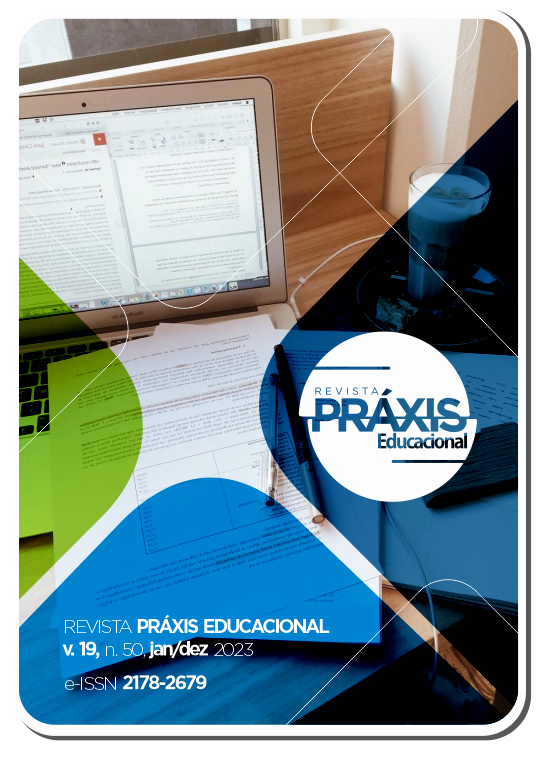Reflections on the indicative method and its use in graduate programs in history and education in Brazil
DOI:
https://doi.org/10.22481/praxisedu.v19i50.12937Keywords:
Carlo Ginzburg, indicative method, history of education, postgraduate programmesAbstract
Since immemorial times, man has sought to understand and act upon the world around him. To this end, he uses several ways to explore his surroundings, seeking an explanation for the phenomena, be they natural or not. One of these ways is based on the attention to elements that may seem insignificant, or irrelevant, but that carry essential information. These elements are called clues, that is, traces that can be spun for the construction of history. This article aims to analyze the conceptualization and historicization of the so-called indicia method using as reflexive support the text: "Signs: roots of an indicia paradigm”, by Ginzburg (1989), at the same time as it inventories the academic production that uses the indicia method in the history of education in graduate programs in History and Education, seeking to understand if this is a theoretical-methodological paradigm viable to the historian of education. The search for the production took place on the Oasisbr Portal using the descriptor "indicial method". This is, therefore, a literature review and document analysis study. The results indicate that most of the research carried out with procedures of the indicative method comes from post-graduation programs in Education. Another important aspect concerns the possibilities of diversification of the research themes, which problematize the body, the woman, pedagogical practices, and educational policies using official sources.
Downloads
Metrics
References
BARROS, José D’ Assunção. Sobre a feitura da micro-história. OPSIS, Goiás, v. 7, n. 9, p. 167-185. 2007. Disponível em: https://periodicos.ufcat.edu.br/Opsis/article/view/9336/6428. Acesso em: Acesso em: 28 mar. 2023.
BURKE, Peter. O que é história cultural?. 2 ed. Rio de Janeiro: Zahar, 2008.
CAPRA, Fritiof. As conexões ocultas: ciência para uma vida sustentável. São Paulo: Cultrix, 2002.
GINZBURG, Carlo. Mitos, emblemas, sinais: morfologia e história. São Paulo: Companhia das Letras, 1989.
GINZBURG, Carlo. O inquisidor como antropólogo: uma analogia e as suas implicações. In: GINZBURG, Carlo. A micro-história e outros ensaios. Rio de Janeiro: Bertrand, 1991.
LIMA, Henrique Espada. A micro-história italiana: escalas, indícios e singularidades. Rio de Janeiro: Civilização Brasileira, 2006.
PIMENTEL, Edna F.; MONTENEGRO, Zilda M. C. Aproximações do Paradigma Indiciário com o pensamento freiriano: uma construção possível? Práxis Educacional, Vitória da Conquista, n. 3, p. 181-194. 2007.
SIMÕES, Regina Helena Silva; FARIA FILHO, Luciano Mendes de. História e historiografia no pensamento de Carlo Ginzburg: tecendo diálogos com a pesquisa histórica em educação. In: LOPES, Eliane Marta Teixeira; FARIA FILHO, Luciano Mendes de. Pensadores sociais e história da Educação II. Belo Horizonte: Editora Autêntica, 2012.
Downloads
Published
How to Cite
Issue
Section
License
Copyright (c) 2023 Práxis Educacional

This work is licensed under a Creative Commons Attribution-ShareAlike 4.0 International License.
You are free to:
Share - copy and redistribute the material in any medium or format; Adapt - remix, transform, and build from the material for any purpose, even commercially. This license is acceptable for Free Cultural Works. The licensor cannot revoke these freedoms as long as you follow the terms of the license.
Under the following terms:
Attribution - You must appropriately give credit, provide a link to the license, and indicate if any changes have been made. You may do so in any reasonable way, but not in a way that suggests that you or your use is endorsed by the licensor.
There are no additional restrictions - You cannot apply legal terms or technological measures that legally restrict others to make any use permitted by the license.










